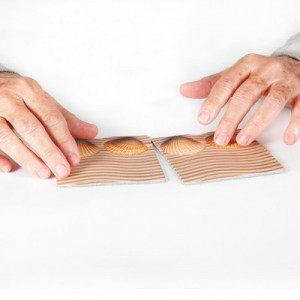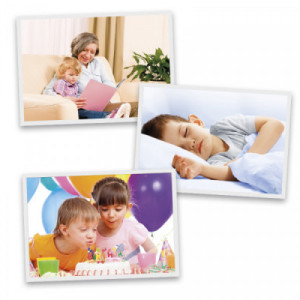Alzheimer's Disease
Alzheimer's is a neurodegenerative disease that causes memory loss, temporal and spatial disorientation and even intellectual deterioration. It is recommended to exercise memory and intellectual activity to slow the progression of the disease.
The most appropriate games are those that stimulate short-term memory, psychomotor skills, attention and communication. Depending on the evolution and needs of the person in each moment we can adapt the type of game or the activities we do.
In this selection you will find games and materials to train memory, association games, games to find differences, games that stimulate the senses, games to form words, and photographs that describe objects, actions or animals. All of them, especially indicated to palliate the progression of the disease.

The best exercises for people with Alzheimer's
The first exercise concerns family members: they need information about the disease. The elderly person with Alzheimer's disease, depending on the degree of evolution of the disease, will need some help or other depending on the symptoms they develop.
Alzheimer's Information: Symptoms
Occasional forgetfulness
Those affected by Alzheimer's suffer from forgetfulness of data, such as the names of their family members, or of well-known tasks that make the patient's daily routine difficult. Repeated questions on the same subject and repeated forgetfulness of the answer. The patient begins to need help with tasks he or she was previously able to handle.
Space-time disorientation
The disorientation may be temporary, when the patient ignores data such as the day or season of the current year; or spatial, because the affected person does not remember the place where he or she is or the way home.
Difficulty in planning and carrying out daily tasks
The Alzheimer's patient makes mistakes in simple calculations, or forgets the steps in which certain tasks are performed, such as visiting a familiar place, or how basic tasks are performed at home. The person can move objects around, and then forget them.
Problems with language and image identification
Alzheimer's patients have difficulty identifying images or using spoken and written language.
Changes in thinking
The older Alzheimer's patient, as the disease progresses, shows frequent changes in mood and ideas when making decisions. The person may feel confused, depressed, or aggressive, while losing the initiative to basic tasks.
Ideal Exercises for People with Alzheimer's
The therapy of attention to people with Alzheimer's disease is approached from a double approach: palliative and preventive. Cognitive rehabilitation seeks to alleviate the effects of brain pathologies through the refinement of other types of skills.
There are encouraging studies on the existence of some plasticity in the brain of elderly people with Alzheimer's disease. The next challenge for medicine and psychology is to discover the best possible way to make the most of the rest of the operation that patients retain and to alleviate their symptoms.
Restorative cognitive rehabilitation
These activities are also beneficial for older people who, without suffering from neuro-generative diseases, suffer from minor neglect as a result of their age. The work is identical to that of therapy in cases of mild Alzheimer's, as it seeks to stimulate the brain to slow down the decline in faculties, such as attention and memory.
It serves to try to restore the lost capacities of the brain as much as possible. It is carried out through games of numerical manipulation, activities with sensory and linguistic stimulation or rehabilitation through the development of compensatory strategies.
The goal is to maintain cognitive activity in a functional state for as long as possible.








































































